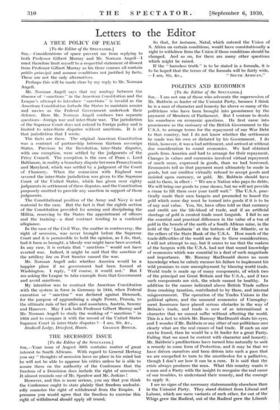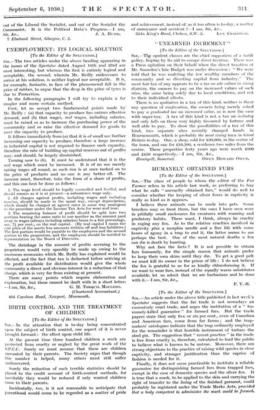POLITICS AND ECONOMICS
[To the Editor of the SPECTATOR.]
am not one of those who advocate the supersession of Mr. Baldwin as leader of the Unionist Party, because I think he is a man of character and honesty far above so many of the politicians who have been brought into prominence by the payment of Members of Parliament. But I venture to doubt his soundness on economic questions. He first came into prominence as the emissary of the British Government to the U.S.A. to arrange terms for the repayment of our War Debt to that country, but I do not know whether the settlement he made was his own or dictated by his Government. I do think, however, it was a bad settlement, and arrived at without due consideration to sound economics. We had obtained goods from America and had to arrange for their repayment. Changes in values and currencies involved virtual repayment of much more, expressed in goods, than we had borrowed. Economists tell us that payment must ultimately be made in goods, but our creditor virtually refused to accept goods and insisted upon currency, or gold. Mr. Baldwin should have said to them, in effect : "We are a Nation who pays its debts. We will bring our goods to your shores, but we will not provide a crane to lift them over your tariff wall." The U.S.A. prac- tically made their own bargain and proceeded to hoard the gold which some day must be turned into goods if it is to be of any real value. You, Sir, have often told us that currency and credit are the life-blood of trade, and if an artificial shortage of gold is created trade must languish. I fail to see the essential and practical difference in the value of a ton of gold in the bowels of the earth of a South African mine, in the hold of the ' Lusitania ' at the bottom of the Atlantic, or in the cellars of the State Bank of the U.S.A. How much of the trade difficulties of the world are due to these considerations, I will not attempt to say, but it seems to me that the makers of the bargain with the U.S.A. had not that sound knowledge of economics which was essential to a deal of such magnitude and importance. Mr. Ramsay MacDonald shows no more knowledge when he calmly excuses his failure to implement his wild promises to cure unemployment by blaming world trade. World trade is made up of many components, of which two of the principal are Great Britain and the U.S.A., and if two such components are sick, the yehole cannot be healthy. In addition to the causes indicated above British Trade suffers from crushing taxation, contributed to by these, and internal. misgovernment. The operation of the Trades Unions in the political sphere, and the unsound economics of Unemploy- ment Insurance have placed serious obstacles in the way of Britain's trade, and trade is now of so international a character that we cannot suffer without affecting the world. This is a fact to which Mr. Ramsay MacDonald shuts his eyes, and I wonder if Mr. Baldwin or any other of our politicians sees clearly what are the real causes of bad trade. If such an one
can be found, then he would be a fit leader for a great Party. Failing that we must be content with character and honesty.
Mr. Baldwin's predilections have turned him naturally to seek a remedy in some form of Protection, and it may be that we have driven ourselves and been driven into such a pass that we are compelled to turn to the unorthodox for a palliative, though I don't see how it can be a cure. It is said that the crisis always produces the man. What this country wants is a man and a Party with the insight to recognize the real cause of our troubles, to understand their remedy, and the courage to apply it.
I see no signs of the necessary statesmanship elsewhere than in the Unionist Party. They stand distinct from Liberal and Labour, which are mere variants of each other, for out of the Whigs grew the Radical, out of the Radical grew the Liberal, out of the Liberal the Socialist, and out of the Socialist the Communist. It is the Political Rake's Progress.-1 am,































 Previous page
Previous page